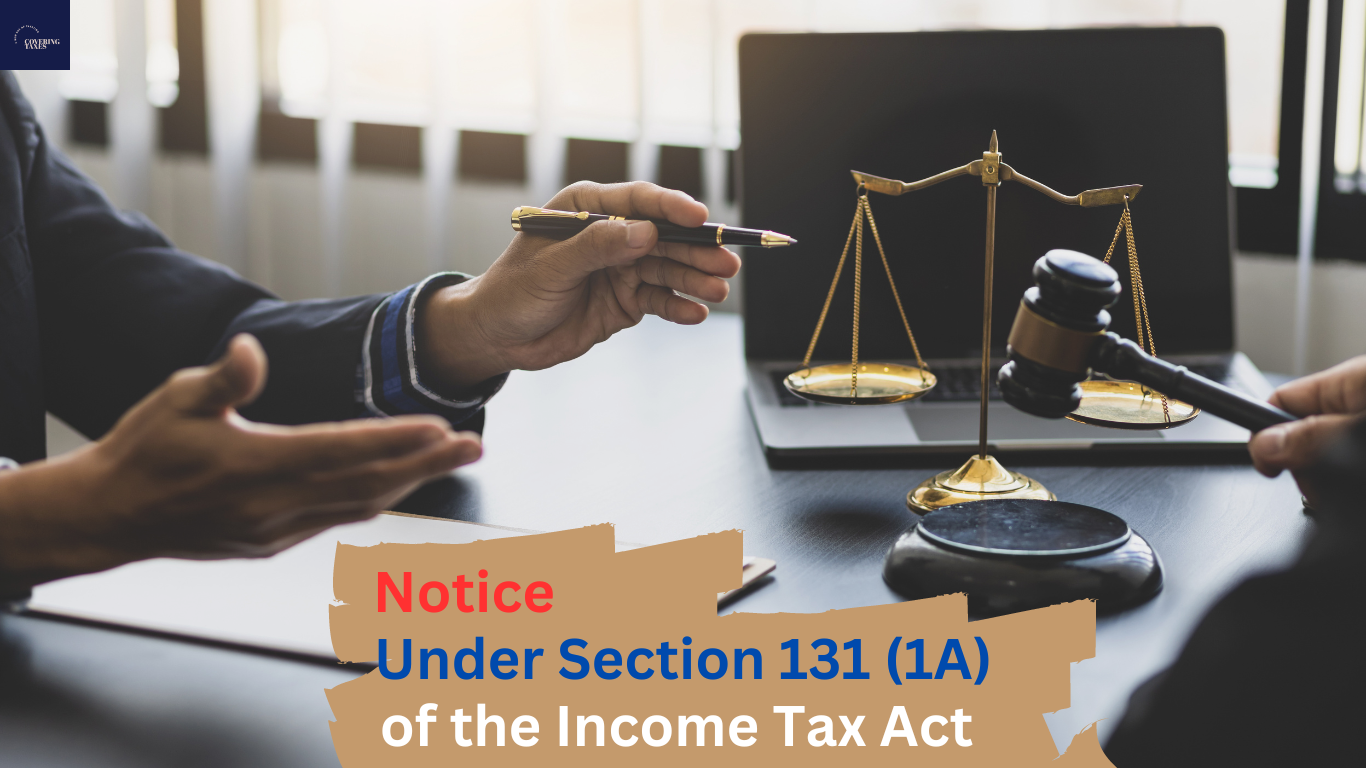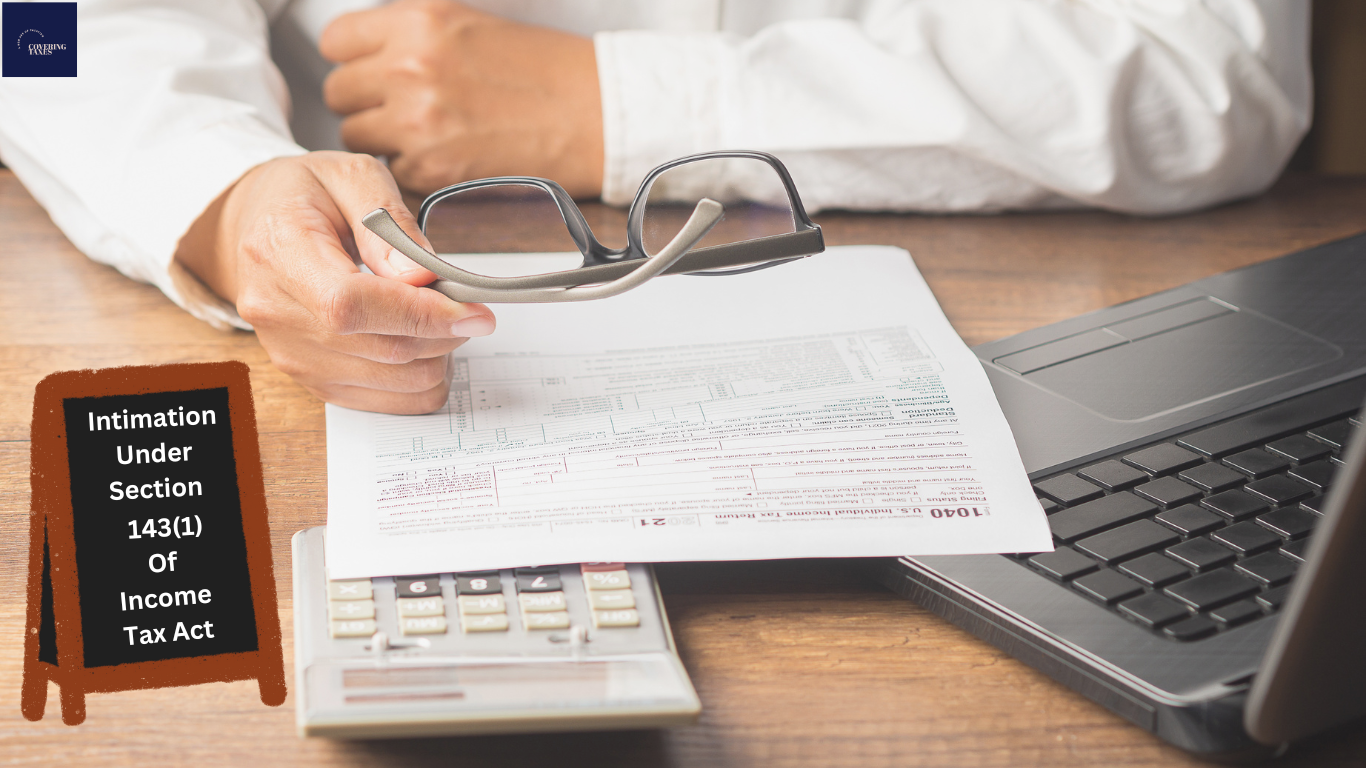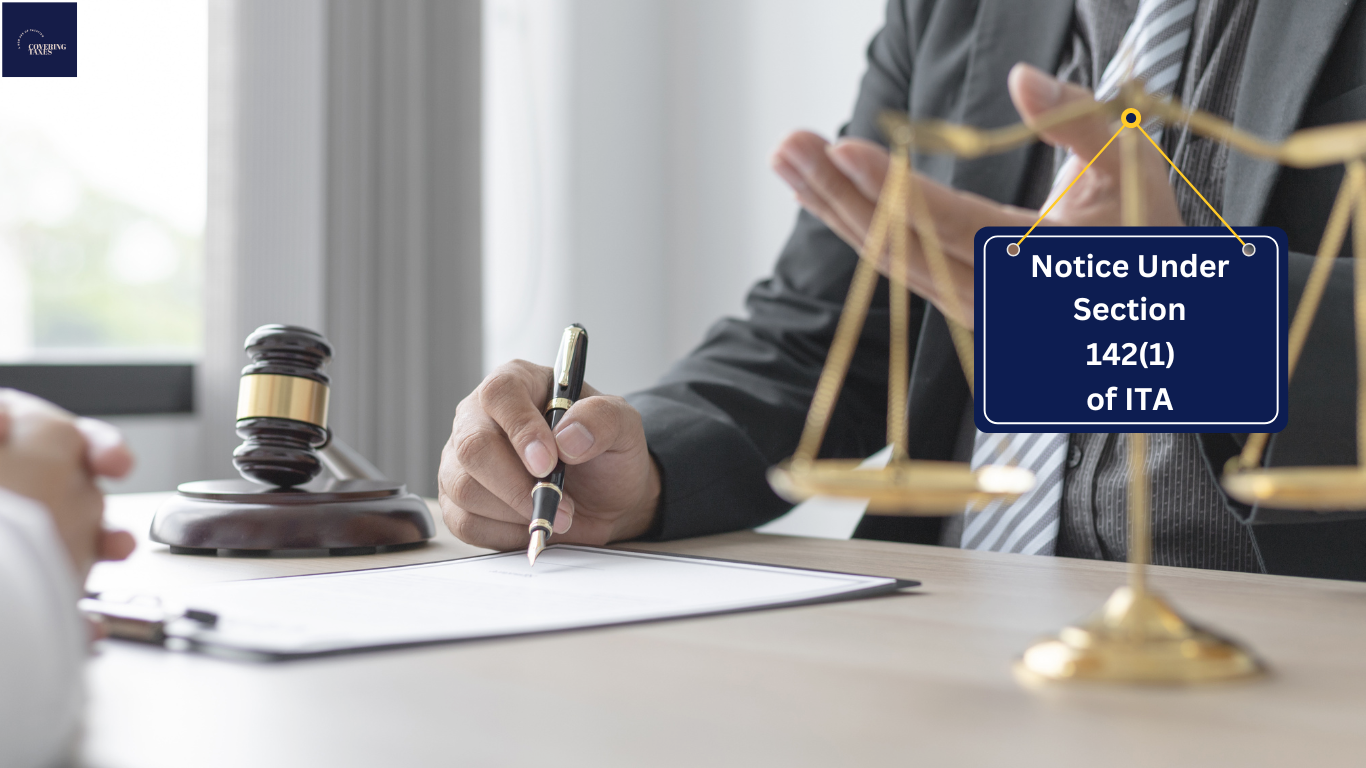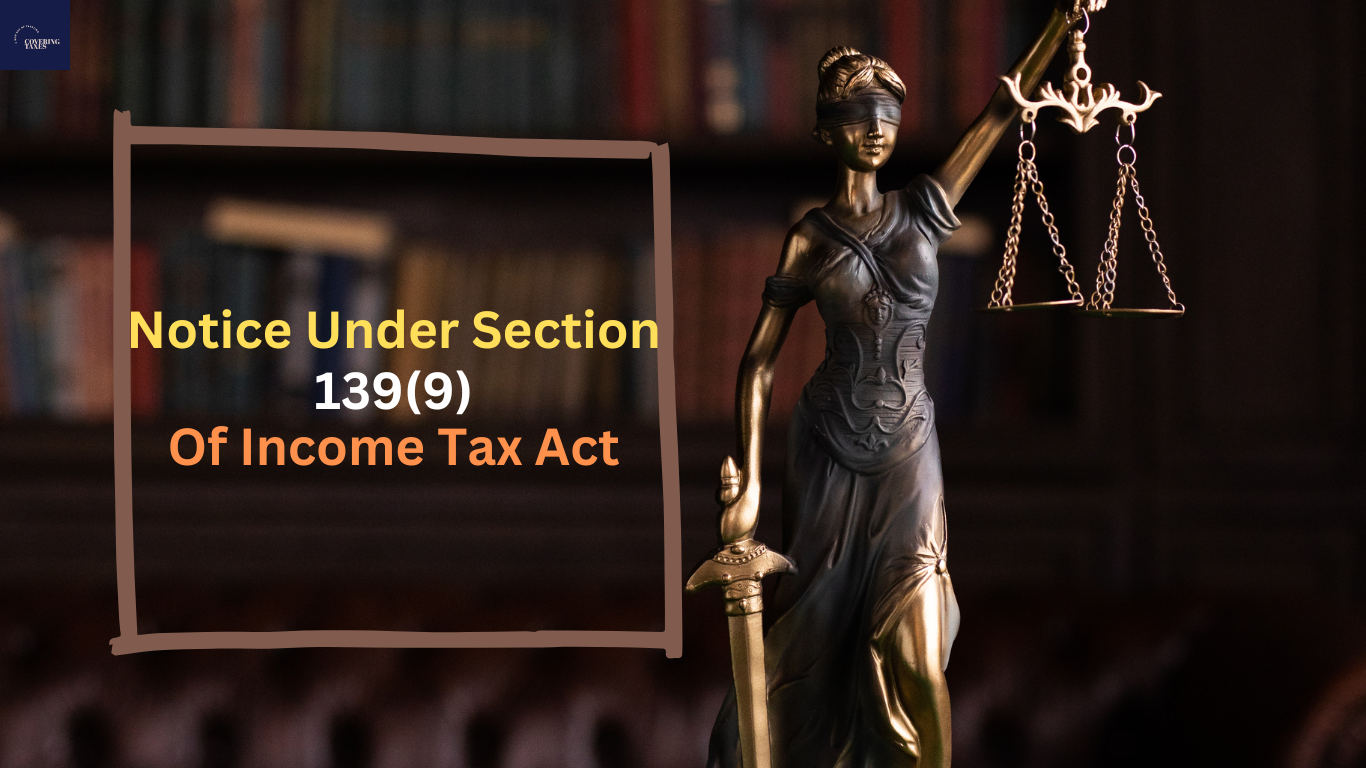
Understanding Section 131(1A) of the Income Tax Act: A Comprehensive Guide

The Income Tax Act of 1961 includes a range of provisions aimed at ensuring compliance and preventing tax evasion. Among these is Section 131(1A), a powerful tool used by tax authorities to investigate cases of suspected income concealment. If you’ve received a notice under this section, it’s crucial to understand its implications and know how to respond effectively. This guide will walk you through everything you need to know about Section 131(1A) of the Income Tax Act, including its purpose, the powers it grants to tax authorities, and the appropriate response to such a notice.
What is Section 131(1) of the Income Tax Act?
Section 131(1) of the Income Tax Act grants tax authorities extensive powers to conduct thorough investigations. These powers are similar to those of a civil court under the Code of Civil Procedure, 1908. This section enables tax officials to summon individuals, examine them under oath, and compel the production of documents and books of accounts necessary for their inquiries. The primary goal is to detect and prevent tax evasion.
Section 131 is part of Chapter XIII-C of the Income Tax Act and is designed to empower tax officers to:
- Conduct inquiries: Tax officers can investigate individuals or entities to discover hidden income or assets.
- Summon individuals: Tax authorities can require any person, including bank officers, to appear for questioning under oath.
- Demand documentation: The law allows tax officers to request the production of books of accounts, financial statements, and other relevant documents.
- Issue commissions: Tax authorities can delegate certain investigative functions to other officers.
These powers are essential for the tax department to ensure that all taxable income is accurately reported and that no income is concealed from the authorities.
Understanding Section 131(1A) of the Income Tax Act
Section 131(1A) expands the powers granted under Section 131(1) to allow tax authorities to act even when no formal proceedings are pending. This section is particularly useful in situations where tax officers suspect that an individual or entity is concealing income or engaging in activities aimed at hiding their true financial position.
Key aspects of Section 131(1A) include:
- Preliminary action: Tax officers can issue a notice under this section before initiating formal actions under Section 132, such as search and seizure operations.
- Suspicion of concealment: The officer does not need to have concrete evidence but must have a reason to suspect that income is being concealed.
- No ongoing proceedings required: Notices under Section 131(1A) can be issued even if there are no ongoing tax assessments or investigations related to the individual or entity in question.
This provision empowers tax authorities to take proactive measures to investigate and prevent tax evasion before it can occur.
Validity of Summons Issued Under Section 131
The validity of a summons issued under Section 131 depends on several factors:
- Clarity of purpose: The summons must clearly state the reason for its issuance and the specific information or documents required.
- Relevance to the investigation: The summons should be based on the belief that the individual possesses information or documents relevant to a tax investigation.
- Compliance with legal procedures: The summons must adhere to the legal formalities outlined in the Income Tax Act, including specifying the time, place, and date for compliance.
Earlier, summonses issued under Section 131 (as opposed to Section 131(1A)) were sometimes deemed invalid if they did not meet these criteria. However, with the introduction of Section 292B, the law now provides that minor errors in the summons do not invalidate it, provided the essential purpose is clear.
Rights of the Assessee Under Section 131
Individuals who receive a notice under Section 131 have certain rights that ensure they are treated fairly during the investigation process:
- Right to fair treatment: The individual should not be subjected to harassment or undue pressure during questioning.
- Right to legal representation: The individual has the right to be represented by a lawyer or tax consultant during the proceedings.
- Right to appeal: If the individual believes that the summons was issued unfairly or in violation of their rights, they can appeal the summons through legal channels.
The Role of Personal Appearance in Section 131 Proceedings
The law generally requires the individual who has been summoned to appear in person. However, a recent notification has allowed for representation by an authorized agent in certain situations. This flexibility can be particularly helpful for individuals who are unable to attend in person due to various reasons.
Issuance of Notices Under Section 131(1A)
Notices under Section 131(1A) are often issued in two main contexts:
- Post-search and seizure: After a search and seizure operation under Section 132, a notice under Section 131(1A) might be issued to gather additional information or clarify details about the materials seized.
- During a survey: Notices under Section 131 are typically issued during a survey if the assessee is uncooperative. If the assessee provides all necessary information during the survey, a notice under this section is unlikely to be issued.
The validity and appropriateness of issuing such a notice can sometimes be controversial, leading to differing interpretations by various courts.
Responding to a Notice Under Section 131(1A)
Receiving a notice under Section 131(1A) can be daunting, but it’s important to handle it calmly and methodically. Here are the steps you should take:
- Understand the notice: Carefully read the notice to understand what is being asked of you. The notice usually indicates that the tax officer suspects undisclosed income or transactions.
- Prepare your response: Gather all relevant documents and evidence that can support your case. This might include property purchase documents, bank statements, and financial records.
- Consider electronic submission: If the notice requests documentation that can be submitted electronically, consider doing so. This can often simplify the process.
- Seek professional help: If you’re unsure how to respond, consider hiring a tax professional. They can help you prepare a thorough and accurate response, potentially avoiding further legal consequences.
- Comply with deadlines: Ensure that you submit your response within the deadline specified in the notice. If you need more time, request an extension from the assessing officer.
The Relationship Between Section 131(1A) and the Civil Code of Procedure
Section 131(1A) derives its powers from the Civil Code of Procedure, allowing tax authorities to issue commissions, enforce attendance, and inspect documents. This section ensures that tax investigations are conducted with the same rigor as civil court proceedings.
Implications of Section 131(1A) on Tax Investigations
Section 131(1A) has several important implications:
- Enhanced cooperation between agencies: The section promotes collaboration between various law enforcement agencies, improving the efficiency of tax investigations.
- Protection of confidential information: Strict provisions ensure that any information shared with tax authorities is kept confidential and used appropriately.
- Effective investigation: By allowing proactive measures, Section 131(1A) helps tax authorities conduct faster and more accurate investigations.
- Deterrence of tax evasion: The risk of detection and punishment under this section serves as a deterrent to those considering tax evasion.
Conclusion
If you’ve received a notice under Section 131(1A) of the Income Tax Act, don’t panic. With the right preparation and professional guidance, you can respond effectively and ensure that your tax matters are resolved smoothly. Always remember to comply with the requirements of the notice and seek help if needed to avoid further complications.
Need help responding to a tax notice? Our team of experts at Covering Taxes is here to assist you every step of the way. Contact us today to ensure your response is accurate and timely.
Frequently Asked Questions
A: Violating the confidentiality requirements under Section 131(1A) of the Income Tax Act can lead to serious repercussions. Individuals found guilty may be subject to a fine and could face imprisonment for up to two years, depending on the severity of the breach.
A: A Notice issued under Section 131(1A) typically indicates that the tax authorities suspect that certain information has been deliberately withheld. In response, you may be required to submit specific documents to validate the transaction in question. Additionally, you could be summoned to appear before the Income Tax Officer to address the concerns raised.
A: Under Section 133A(1) of the Income Tax Act, authorized tax officials have the power to conduct surveys by entering any premises during business hours where a trade or profession is carried out. These surveys aim to gather accurate information about a taxpayer’s income for the financial year and to establish jurisdiction over the case. The primary goal of these inspections is to ensure that the declared income aligns with actual earnings.
A: An Income Tax Officer holds significant authority when investigating potential tax violations. Their powers include:
- Conducting investigations and inspections.
- Mandating the presence of individuals, including bank officers, for questioning under oath.
- Requiring the submission of financial records and other relevant documents.
- Issuing commissions for further inquiries.
- Performing search and seizure operations.
A: Income Tax Inspectors are not classified as gazetted officers. Only those at the level of Income Tax Officer or higher are considered gazetted. Officers below this rank, including Inspectors, are non-gazetted. Once an officer is promoted to the rank of Assistant Commissioner, they are designated as Group A officers by the President of India. process helps in ensuring that your nominations are securely recorded in the EPF system.
A: An Income Tax Inspector plays a crucial role within the Income Tax Department, a central authority tasked with the collection and oversight of income taxes. This position, highly sought after through the SSC CGL exam, involves ensuring compliance with tax laws, investigating financial discrepancies, and contributing to the enforcement of tax regulations. Taxes are mandatory contributions levied on individual earnings and business profits to fund government activities.
A: The Income Tax Department operates under the leadership of the Central Board of Direct Taxes (CBDT). This governing body is responsible for enforcing various direct tax laws, with the Income Tax Act of 1961 being the most significant. The CBDT ensures the effective collection of revenue, which is vital for the functioning of the Indian government.
About The Author

Gagan Gupta
Founder & CEO
Gagan Gupta is a distinguished authority in the realm of accounting and tax compliance. With extensive expertise in managing comprehensive tax compliance procedures—ranging from income tax and GST to TDS and TCS filings across various industries—Gagan has established himself as a pivotal figure in the field. His proficiency extends to meticulously teaching the intricacies of the filing process, elucidating even the most minute details, and identifying common errors along with their resolutions.
Gagan Gupta’s profound understanding of every facet of taxation and accounting enables him to share invaluable insights through industry-specific blogs. These blogs serve as a rich resource for fellow industry professionals, including advocates and Chartered Accountants (CAs). By imparting his extensive knowledge and practical experience, Gagan Gupta not only enriches his readers but also contributes significantly to the broader discourse in the taxation and finance community.




